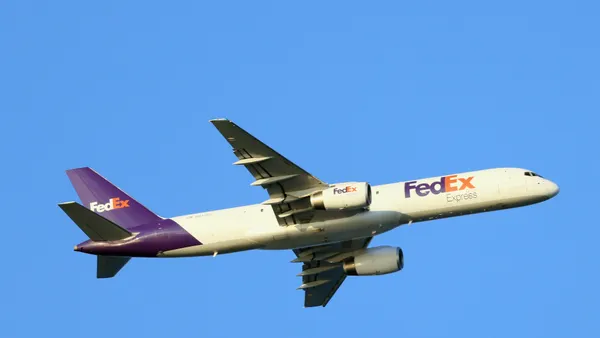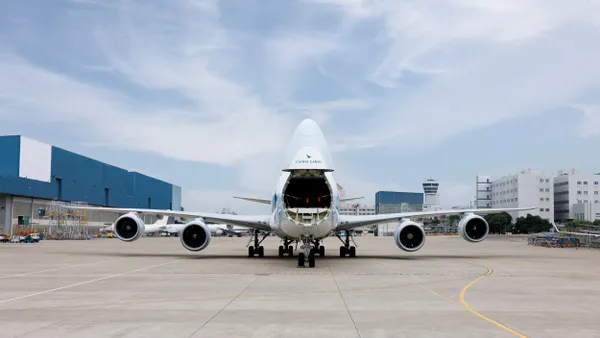Dive Brief:
- The Federal Aviation Administration (FAA) will allow airlines to remove seats and use seat tracks to secure cargo in passenger airplanes if there are no passengers on board, according to an exemption issued by the agency Tuesday
- The agency also extended a previous exemption that allowed airlines to carry cargo on seats through July 10, 2021, and provided more details on crew training.
- Airlines for America applied for the exemption to remove seats on May 6, arguing it was in the public interest that the planes be available to move essential cargo during the coronavirus pandemic. "I find that a partial grant of exemption is in the public interest," James E. Wilborn, the acting manager of the transport standards branch policy and innovation division within FAA's Aircraft Certification Service, wrote in granting the exemption. The exemption will remain in place until July 10, 2021.
Dive Insight:
As coronavirus cases creep up across the country, it has similarly led to another uptick in demand for personal protective equipment (PPE), according to forwarders who spoke with Supply Chain Dive.
In April and May, airfreight rates skyrocketed because "everyone everywhere needed PPE yesterday," Brian Bourke, the chief growth officer at Seko Logistics, told Supply Chain Dive in an interview.
But many companies were able to fill stockpiles, and last month many shippers began turning back to the slower ocean freight again for PPE shipments.
"While stockpiles amassed, many are drawing down, thus creating a renewed demand for air-cargo services," Brandon Fried, the executive director for The Airforwarders Association, told Supply Chain Dive in an email, adding that "we regret that these rules did not come sooner, as many carriers outside the U.S. have been allowed to operate passenger planes without seats for quite some time."
Emirates, for example, took the step of removing seats for cargo space last month, according to Arabian Aerospace.
"The continued use of passenger planes to fly PPE boxes has been essential in meeting increased vital supply demand for the industry worldwide and of course, here in the United States," Fried said.
While the demand for PPE is increasing, the economics of shipping via ocean freight is simultaneously changing, Bourke said.
Overall demand for ocean freight has fallen, but the carriers have cut so much capacity that demand relative to capacity is actually up, which is similar to what happened to airfreight in April and May, he said.
"The transit time is now getting really long," Bourke said. "If it's 20 days or 30 days, now it's taking 40 days all in end-to-end. So, that's happening at the same time that there's a spike in demand for PPE. So, that imbalance is happening again. And that's why airfreight is becoming an option now."
When Airlines for America filed its request for an exemption, airfreight rates were near their peak of $10.21 per kilogram to move cargo between China/Hong Kong. The U.S. rates have since fallen, but the latest numbers from the TAC Index show a slight uptick in rates over the last week from $4.38 per kilogram to $4.53 per kilogram.
In its request for exemption, Airlines for America said its members had seen passenger traffic fall 96% compared to last year as a result of the pandemic.
"It will enable U.S. airlines to continue supporting emergency response efforts during this health crisis," a spokesperson for Airlines for America said of the FAA's most recent decision in an email to Supply Chain Dive.
While cargo won't make up for the lost income "every little bit helps," Bourke said.
"U.S. passenger airlines have operated thousands of the 'ghost' flights globally and we are glad they will have the option of flying them without seats to accommodate more cargo," Fried said. "However, removing seats can be a time consuming and expensive process so unless already planned as part of a refurbishment, carriers may need to accurately predict the long-term sustainability of demand to justify the cost."
Neither American Airlines nor United Airlines plans to remove seats on their planes for cargo, spokespeople for the companies told Supply Chain Dive.
"Delta Air Lines is currently evaluating the use and opportunity of removing seats in aircraft for cargo purposes," a company spokesperson told Supply Chain Dive.
This story had been updated with comments from American Airlines and United Airlines.














